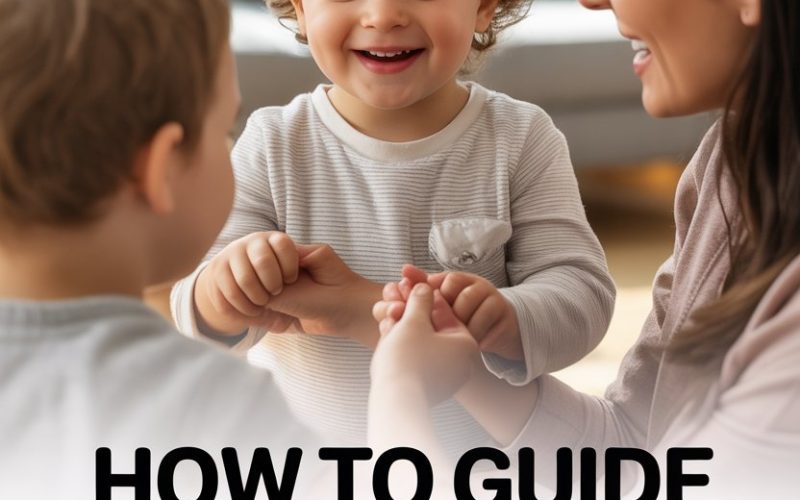Ever tried reasoning with a two‑year‑old who has the moral certainty of a Supreme Court judge and the stamina of a caffeinated squirrel? Then you know the challenge of guiding a strong toddler with gentle discipline.
Take a deep breath and prepare for that moment your little one discovers their own voice—and possibly your hidden chocolate stash.
Strong Will Isn’t a Flaw
Parents of strong toddlers often hear, “Well, she certainly knows what she wants!” It’s said with a mixture of admiration and a dash of sympathy. The truth? Strong will isn’t something to squash.
According to child‑development experts, these pint‑sized powerhouses are simply bursting with curiosity, determination, and a need for autonomy.
Guided gently, these traits lay the groundwork for future leaders, problem‑solvers, and yes, passionate negotiators at bedtime.
Rethinking Discipline
Gentle discipline is often misunderstood as permissiveness or a lack of consequences. Not quite.
Gentle discipline is about teaching, not punishing. The aim? Help your child learn self‑control, empathy, and responsibility—without crushing their spirit.
The American Academy of Pediatrics backs this up, emphasising that discipline should guide behaviour rather than instil fear.
Connection First, Correction Second
When your toddler melts down because you dared serve porridge instead of toast, your instinct might be to launch into lecture mode. But connection is the real magic trick.
Get down to their level, offer a hug, and name their feeling: “You’re really upset we’re out of toast.” You’re not giving in—you’re showing you see their struggle, which calms their brain and makes it more likely they’ll hear what you say next.
Consistency Is Queen (or King)
Toddlers are like tiny scientists, always testing the boundaries of gravity, patience, and parental resolve. Consistency is the glue that holds your gentle discipline together.
Explain expectations in simple language—“We use gentle hands.” Then stick to it. If hitting means a toy takes a break, follow through every time. Consistency is how little minds learn what’s expected—no matter how many repeats it takes.
Offer Choices, Not Ultimatums
Instead of “Put your shoes on or else,” try “Would you like to wear your spotty wellies or your red trainers today?” Offering controlled choices lets strong toddlers feel powerful—without handing over the keys to the kingdom.
Keep choices simple; too many options overwhelm.
Model the Behaviour You Want
Toddlers are expert mimics. If they see you shouting when you’re frustrated, guess what they’ll try in the supermarket queue? Narrate your feelings: “I’m feeling cross, so I’m taking a deep breath.”
This teaches emotional regulation (and might save your sanity when raisins fly across the kitchen).
Praise Effort, Not Just Outcomes
We all love a gold‑star moment, but praising effort helps toddlers develop grit. Swap “Good girl for picking up your blocks” for “You worked really hard to tidy up—that was helpful.”
Research by Stanford psychologist Carol Dweck shows praising effort nurtures a growth mindset, helping children learn that persistence pays off—even when things don’t go perfectly the first time (NPR interview).
Redirect, Don’t Reprimand
Strong toddlers are built to explore—and sometimes that means testing rules. Redirect their energy to a safer activity.
If your child is climbing on the sofa (again), say, “Sofas are for sitting, but you can climb the cushions on the floor.” You’re shifting the focus from can’t to can—while saving the upholstery.
Keep Calm and Carry On (Even When It’s Chaos)
Meltdowns happen—yours and theirs. When voices rise, keep yours gentle and low. Set limits with calm words: “I can’t let you hit me, but I can help you calm down.”
Staying calm shows your child how to handle big feelings with composure—long after any timeout would be forgotten.
Repair After Conflict
No one gets it right every time. Maybe you snapped or threatened to throw the iPad out the window (no judgment—we’ve all been there). Apologise sincerely: “I’m sorry I shouted. I was upset, but it wasn’t okay to yell.”
Humility shows that mistakes can be mended with honesty and love.
Set Simple, Realistic Expectations
Some battles aren’t worth picking. A strong toddler isn’t wired to sit still through a three‑hour dinner or share every toy with a visiting cousin.
Keep rules short and sweet, align expectations with their stage, and save energy for the non‑negotiables.
Distraction Is Your Secret Weapon
When all else fails, embrace distraction. If your toddler’s beelining for the biscuit tin before supper, whisk them off to hunt for their stuffed animal.
Distraction isn’t a cop‑out; it’s a clever pivot before a tantrum brews.
Stay Playful
Turn chores into games: race to the bathroom, sing a silly tidy‑up song, or use your best theatrical voice. Playfulness breaks tension, sparks cooperation, and reminds everyone that parenting doesn’t have to feel like an endurance sport.
Call in the Cavalry
Some days you’ll need backup. Swap strategies with another parent (preferably over coffee), talk to a paediatrician about persistent challenges, or read trusted sources like ZERO TO THREE’s discipline guide.
Strong‑willed doesn’t equal “bad,” and seeking help is wisdom, not weakness.
A Season, Not a Sentence
Gentle discipline with a strong toddler can feel like herding cats through a thunderstorm. Yet this stage is a stage. The skills you model now shape your child’s character for years to come.
Keep humour handy and trust that the child insisting on pyjamas at the supermarket may become the adult who stands up for what’s right—hopefully in office attire.
You’ve Got This
No parent gets a medal for surviving toddlerhood (though a hot cuppa wouldn’t go amiss). Gentle discipline isn’t about perfect obedience—it’s about raising a resilient, kind, confident human.
Every loving boundary, every hug after a meltdown, every deep breath you take is a step forward. Keep going—your toddler is lucky to have you as their guide.




